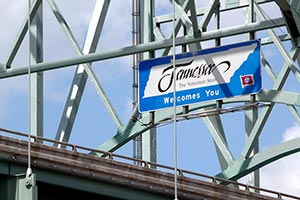Tempers Flare Among Tennessee House GOP Members Over Gas Tax Bill

NASHVILLE, Tenn. — Members of Tennessee's House Republican supermajority quarreled March 30 on issues related to GOP Gov. Bill Haslam's plan to boost transportation spending with fuel tax increases.
Tempers first flared on the House floor over an unrelated bill allowing Nashville to direct future sales tax revenue to pay for a Major League Soccer stadium if Tennessee businessmen win approval for a franchise expansion.
The bill, handled by GOP Caucus Chairman Ryan Williams of Cookeville, drew harsh questions from Rep. Jerry Sexton (R-Bean Station) an opponent of Haslam's gas tax.
Efforts by Sexton and like-minded Republicans — who oppose the gas and diesel tax increases — to push an alternative plan to redirect $200 million in existing state sales taxes for road improvements were thwarted at the committee level.
The argument against the Sexton plan was that fuel taxes are in effect a user fee and that general fund revenue from sales taxes, which helps pay for education and other general functions of state government, wasn't fair to non-drivers, went against decades of practice and was risky.
Sexton questioned Williams on why the Nashville sports authority sales tax bill was acceptable while his and others' effort to divert sales tax funds for transportation was not.
"I've heard it said many times, 'It's just not fiscally sound to do that,' and yet it's OK whenever certain parties think it's OK. I rest my case," Sexton said. "I just think it's a hypocrisy that we can do certain things whenever we want to whenever it's agreed to by certain people, but if you're not in a certain class down here, you don't get to do that. I rest my case."
House Transportation Subcommittee Chairman Terri Lynn Weaver (R-Lancaster) agreed. That prompted Williams and others to explain the situations weren't comparable because the Nashville bill was addressing future state and local revenue that would be generated as a result of a new stadium's operations if the deal went through.
The additional sales taxes wouldn't materialize unless the franchise became a reality, Williams and others said, pointing to similar arrangements for professional teams including the Tennessee Titans' NFL stadium and the Memphis Grizzlies NBA team.
Former Majority Leader Gerald McCormick (R-Chattanooga) then weighed in with a warning to members.
"There's been a lot of discussion that's bordering on breaking our rules," he said. "We need to be careful about questioning people's motives and using words like 'hypocrisy' and questioning people's integrity."
Without mentioning Weaver and Sexton by name, McCormick, now Budget Subcommittee chairman, said there is no hard and set rule against using sales taxes from the general fund for transportation.
"We are allowed to do that," McCormick said, telling disgruntled fellow Republicans, "you've got to get 50 votes in the House and 17 in the Senate, and you can do it. So this idea that we're not allowed to is not true. We are allowed to. Gather your votes up and do it if you want to."
A second squall brewed later when Majority Leader Glen Casada (R-Franklin) sought to suspend rules to bring a veterans property tax relief funding bill to committee next week. Republican senators included the relief, albeit in a lower amount, in the transportation bill among other tax cuts intended to balance out the impact of the fuel-tax increase on Tennesseans.
Opponents of the gas tax are furious over the Senate's move, now in the House transportation bill. Some members also have stand-alone bills dealing with the veterans' tax relief. They and others also aren't happy with the prospect of voting against the gas-tax bill with the veterans' relief provision in it.
The bill is sponsored by Rep. Timothy Hill (R-Blountville) and Sen. Mark Green (R-Clarksville) a 2018 GOP gubernatorial candidate who may be in line to be nominated by President Donald Trump for U.S. Army secretary.
Local Government Committee Chairman Tim Wirgau (R-Paris) who angered gas tax-increase opponents by ramrodding the transportation bill through his committee over the objections of Sexton and other critics, questioned why one veterans relief bill was being singled out for the preferential treatment.
Casada backed off.
Sexton later became agitated yet again, complaining he wasn't recognized when he sought recognition from Speaker Beth Harwell (R-Nashville).
Later, Republican Senate Speaker Randy McNally of Oak Ridge, and Majority Leader Mark Norris (R-Collierville) defended inclusion of the veterans property tax relief in the roads bill along with reductions in the sales tax on groceries, a cut in corporate taxes for manufacturers and yet another provision lowering a tax on wealthier individuals' investments.
McNally said they had to do some persuading for Haslam to go along with restoring the veterans relief after the governor pushed for the reduction a few years ago, saying the current program was unsustainable.
If lawmakers are successful in passing a stand-alone bill and adding the necessary funding as an amendment to the budget, the governor's line-item veto power gives him authority to kill it.
Democrats, meanwhile, were amused by all the Republican quarreling, saying the GOP has treated them roughly since Republicans assumed complete control of the House and Senate in 2011.
"Republican-on-Republican crime, as we call it," quipped Rep. Antonio Parkinson (D-Memphis) to reporters.
"They've created a beast in Rep. Sexton because of what happened in Local Government Committee," Parkinson added. "This week, they created that monster in him. We as Democrats were used to that treatment, not having our constituents' voices heard. Now they did it to one of their own."




